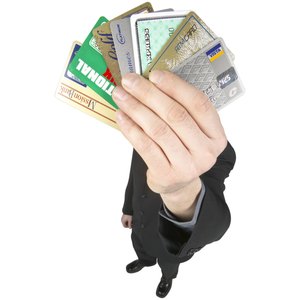
Both credit card users and issuers can cancel credit cards. If you want to cancel a card, you should think twice, because having available -- but unused -- credit actually has a positive effect on your credit report. On the other hand, if your account is closed, canceled or charged off due to nonpayment, it has a negative impact on your credit score. A card issuer can also close your account if it reviews your credit report and sees that your overall credit profile is declining -- even if you’ve made all your payments on time.
Canceled Due to Nonpayment
If your card issuer closes your account or cancels your card due to nonpayment, it should show up on your credit report just as a late payment would. Most companies report at the end of the month or the beginning of the following month. If your card issuer cancels your account during the month, it will likely report the closure at the next reporting date. The cancellation receives a code that shows that the creditor, not you, initiated the cancellation. This hurts your credit in two ways. Having your account closed by a credit card issuer is a negative, and the loss of your credit utilization also damages your credit score.
Using Available Credit
Credit utilization is the amount of credit you have versus how much you really use. If you have $1,000 in credit, but only use $300, your credit utilization is 30 percent. If you cancel a card that has $500 in available credit and still have $300 on your other cards, your credit utilization is now 60 percent. If your credit utilization exceeds 30 to 35 percent, it starts to hurt your credit. Canceling an account does not remove the account's payment history from your credit history, whether it's good or bad. Late payments can continue to hurt your credit standing for up to seven years.
Review Before You Cancel
Before you cancel or close a credit card account, look at your total number of accounts, the interest rate and any fees attached to them, how much you use them and the positive or negative effects they have on your credit score. Closing or canceling your own account does not necessarily harm your credit, even if it shows up on your credit report right away. But losing the available credit tied to the cancelled card and raising the percentage of credit you're utilizing will lower your score.
Canceled for Other Reasons
A card company can also monitor your credit report even after it's issued you a credit card. If the issuer starts to see a pattern of negative events on your credit report, it can close your account or reduce your available credit without previous warning. The issuer does have to notify you within 30 days after the closing. If the card is canceled due to nonpayment, late payments or no account activity, the issuer does not have to give you advance notice. If the company closes your account for any reason -- other than default or delinquency -- the reporting of the closure should not negatively affect your score.
References
Writer Bio
Chris Brantley began writing professionally for a financial analysis firm in 1997. From 2000 to 2004, he worked as a financial advisor, specializing in retirement planning and earned his Series 7, Series 66 and insurance licenses. Brantley started his full-time writing career in 2012 and has written for a variety of financial websites, including insurance, real estate, loan and investment sites. He holds a Bachelor of Arts in English from the University of Georgia.

